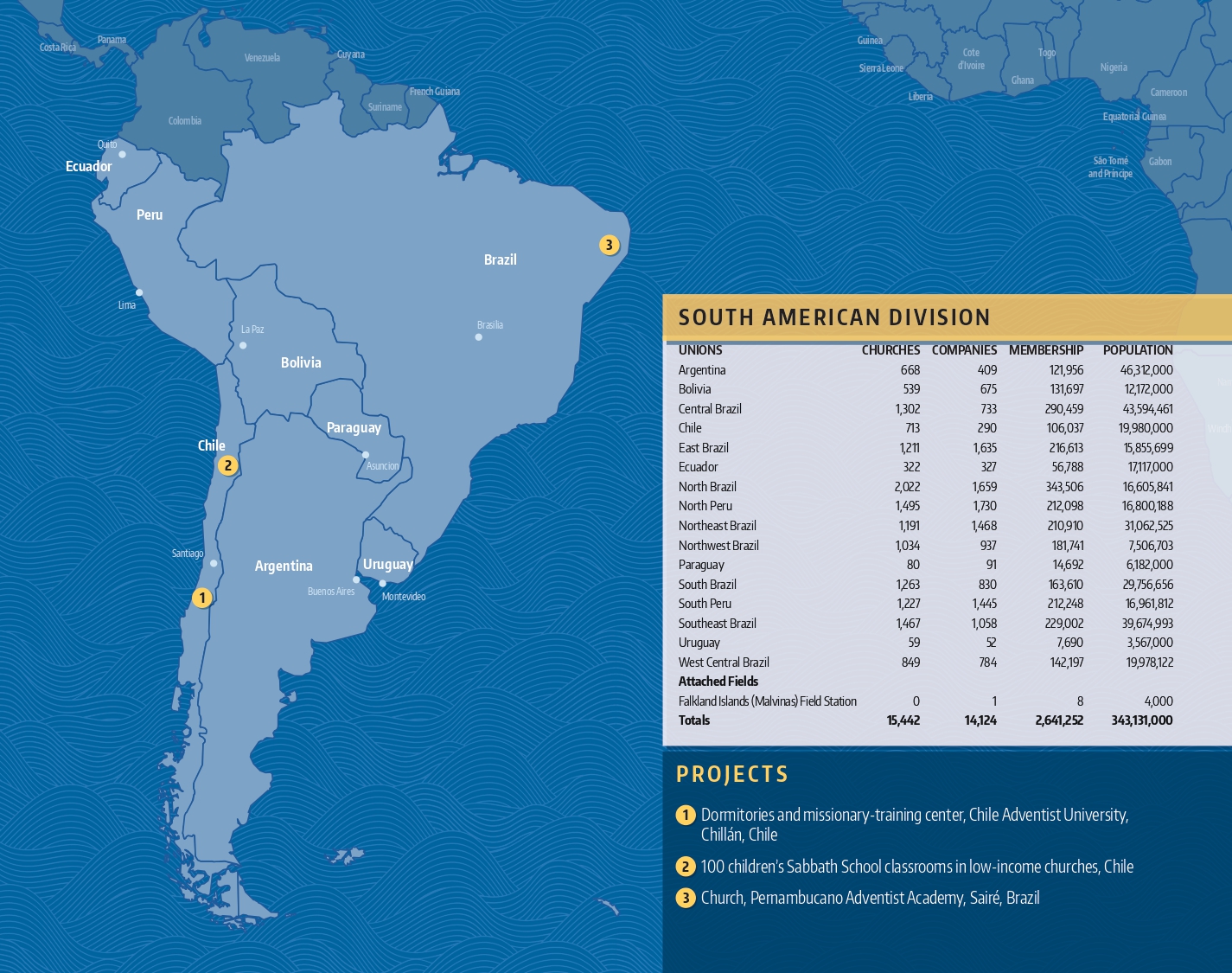Unexpected Missionaries: Adult Mission Story for December 6, 2025
Alvaro and Natalia never planned to become missionaries on a far-off island.
The couple had been happily married for nine years in Chile. He worked as a dentist for the Seventh-day Adventist Church. She was a physical therapist at Chile Adventist University. They had a 3-year-old daughter, Catalina.
Then they heard a sermon about Adventist Volunteer Service, an organization where Adventists can volunteer to help the Adventist world church in its mission to proclaim the gospel around the world. They felt that God was calling them to volunteer.
“Can we do this as a family?” Alvaro and Natalia asked each other.
They felt terribly old. It seemed like only university students and young people in their 20s volunteered with Adventist Volunteer Service. Alvaro and Natalia were both 35 years old.
The couple spoke with the university pastor, who had made the appeal in his sermon.
The pastor assured them that God calls people of all ages to be missionaries. So, the couple took volunteer training at the university and looked for job openings on VividFaith.org, an Adventist Church website where people can apply for volunteer positions. They felt drawn to an opening for volunteers to serve a year on remote volcanic Easter Island, and they applied for the position.
A short time later, the couple received the news that their application had been accepted, and they were asked to leave for Easter Island in two weeks. They were surprised about the speed with which God had answered their prayers. It was their first lesson as missionaries. They saw that God was in charge, and they needed to submit.
Two weeks later, the family boarded a plane and flew 5 hours and 30 minutes to Easter Island. They landed at an airport that is considered to be the most remote in the world. It is located about 2,350 miles (3,780 km) from the next nearest airport.
A very different culture greeted the family. While the Roman Catholic influence was strong on mainland Chile, people on the island leaned on ancestral teachings.
On mainland Chile, everyone spoke Spanish, but on the island everyone spoke the Rapanui language.
Alvaro and Natalia had never felt trapped on mainland Chile, which is one of the longest countries in the world stretching about 2,650 miles (4,265 km) from the north to the south. But Easter Island covered only 63 square miles (101 sq km), and most of its 3,800 people lived in the capital, Hanga Roa.
Food was never a problem on mainland Chile, but bread was rationed on the island. Sometimes there was no flour. Food arrived by boat, and the tides didn’t always allow the boats to dock.
Complicating matters, the couple quickly learned that many islanders didn’t like people from the mainland. This made it difficult to make friends and gain people’s trust.
Remembering how quickly God had brought them to the island, Alvaro and Natalia decided to trust in Him and take His hand.
Then God began to work in an amazing way.
Alvaro worked in tourism rather than dentistry in order to meet more people and better promote the Seventh-day Adventist church. Natalia got a job at the local hospital. They bought a small motorcycle and went door to door, making visits and giving Bible studies.
The couple was also responsible for leading the local Adventist church, which had 10 elderly members when they arrived. For the next year, Alvaro and Natalia did everything that a pastor does except baptize and officiate weddings. They even conducted a funeral.
As they worked at the church, they reopened clubs for Pathfinders and Adventurers that had previously been closed. To their delight, about 25 children showed up for the first meeting. As the months passed, the number of children grew and grew. The couple trained local Master Guides, and placed the Pathfinder and Adventurer clubs into their hands. When they left, the two clubs had 95 children, and the children were bringing their parents to church on Sabbath. One Pathfinder and his mother had also been baptized. A pastor flew to the island to carry out the baptism.
Alvaro and Natalia said it was a challenging year, but they wouldn’t change anything about it.
“Thanks to God, the church now has local leadership on the island, and the Pathfinder and Adventurer clubs have remained open,” Natalia said. “We believe that God did a lot in the year that we were there. He opened the way.”
Alvaro, Natalia, and Catalina served as Adventist Volunteer Service missionaries for one year on Easter Island after hearing a sermon at Chile Adventist University and receiving volunteer training there. One of the mission projects for this quarter is to open an expanded Adventist Volunteer Service center at the university that will train even more missionaries. Thank you for giving generously to this important project.

Easter Island is famous for its more than 600 giant stone heads (moai), which were erected sometime between 1050 and 1680 AD. Many of the statues stand 10 to 20 feet (3 to 6 meters) high, but the largest statue still standing is about 37 feet (11 meters) tall.


